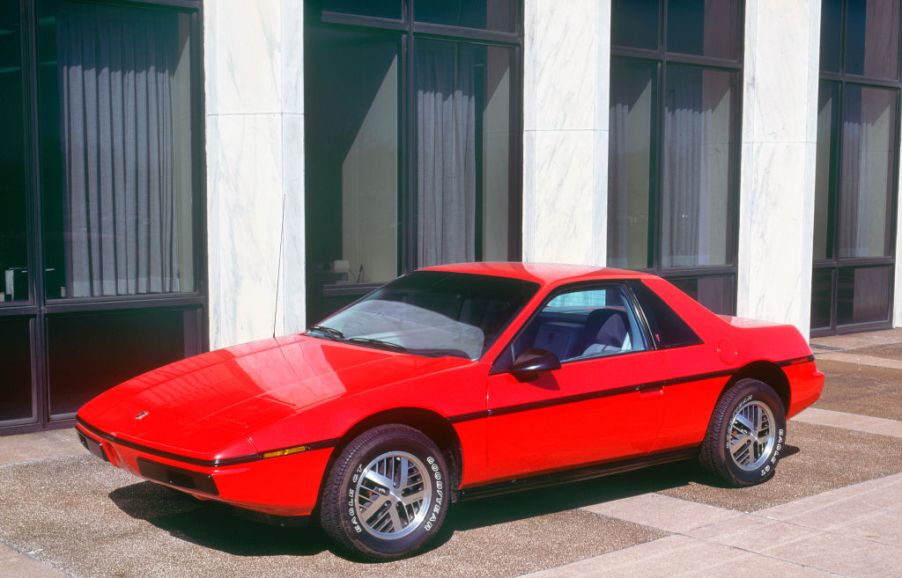
Throwback: Pontiac Fiero
In the early 1980s, Pontiac had lost its way a bit. It was dealing with new smog regulations and realizing that the buying public was leaning toward smaller and more fuel-efficient vehicles. In contrast, Pontiac was used to making larger vehicles and pushing the message that V8 power is the king. So, Pontiac would set out to work on a solution to their status quo that would hopefully bring excitement back to the brand. That’s how the Pontiac Fiero was born.

In an interview with the New York Times in May 1981, William E. Hoglund, then General Manager of Pontiac said,
“Mr. Hoglund says, the division has decided to recapture its performance image and concentrate on the modern youth market, buyers from 18 to 44 years of age. And it plans to do so without that symbol of American automotive muscle, the V8 engine.”
Concepts were created for a small, economical sports car with a V6 engine. But, as the concept progressed, cost concerns meant that the vehicle would have to draw from mechanicals of existing vehicles in the General Motors stock. The rear suspension was modified from a Chevrolet Citation, and the front suspension was drawn from a Chevrolet Chevette. The hopes of the V6 would have to be delayed, as the four-cylinder would be the engine choice to attack the fuel mileage concerns.
Pontiac Fiero Introduction
The finalized version of the concept was finally introduced to the public as the Pontiac Fiero. It was a sporty, two-seater that had a fiberglass paneled body over a space frame, was wedge-shaped, mid-engined, and was smaller and not as costly as the Chevrolet Corvette. It also had pop-up headlights, a consumer favorite.

The shape of the vehicle screamed, sporty performance. The base $7,999 price point gave the public an opportunity to own a more affordable, aggressive-looking vehicle, like the main character from the then-popular television show, Magnum, PI. He also had a wedge-shaped, pop-up headlight vehicle, although it was a significantly more costly vehicle from Ferrari. Furthermore, the Fiero was powered by a four-cylinder that promised over 30 miles per gallon.
Fiero Is A Hit
Sales of the Pontiac Fiero immediately took off. Pontiac had the hit they needed. Even though a six-cylinder was promised in the future, the introductory four-cylinder model was snapped up almost faster than Pontiac could make them. The Fiero even became the official pace car of the Indianapolis 500 for 1984.

It’s Fire!
The first year of any new car is a year of working out any bugs that don’t manifest themselves during the manufacturer’s testing of a vehicle prior to its introduction. Well, apparently, during Pontiac’s testing, having the engine catch fire was not a concern. However, after the vehicle was introduced, the consumers raised the alarm based on real-world experience that the Fiero was catching fire. According to NHTSA, 135 caught fire.
Pontiac’s Fiero fire problem was identified and fixed. But, Pontiac struggled to shed its fire reputation and annoying quality issues that were popping up. It would keep updating the Fiero along the way, including adding the promised V6. In 1988 Pontiac finally overhauled the Fiero as well by throwing new suspension components, brake and steering system updates, and tweaking the engines. However, it was too little, too late. That would be the final year of the Fiero’s production.
Excitement
As an aside, the recent excitement of the introduction of the mid-engine C8 Corvette has reminded some people of the Pontiac Fiero. Both come from the same parent company, General Motors. Some people are even calling for the Fiero’s return.
The Fiero was a good concept at heart. It helped Pontiac to get out of the big cars and V8 mentality it previously had. It also helped bring some excitement back to the manufacturer, even if the initial four-cylinder left consumers wanting more power. But, some would argue that the mismanagement of the program would cause the delivery of the concept to be mediocre and lead to the Fiero’s premature death. It was not all a loss though, as the lessons learned with the spaceframe and fiberglass paneling would go on to underpin the vehicles from Saturn, another sister division within General Motors.


